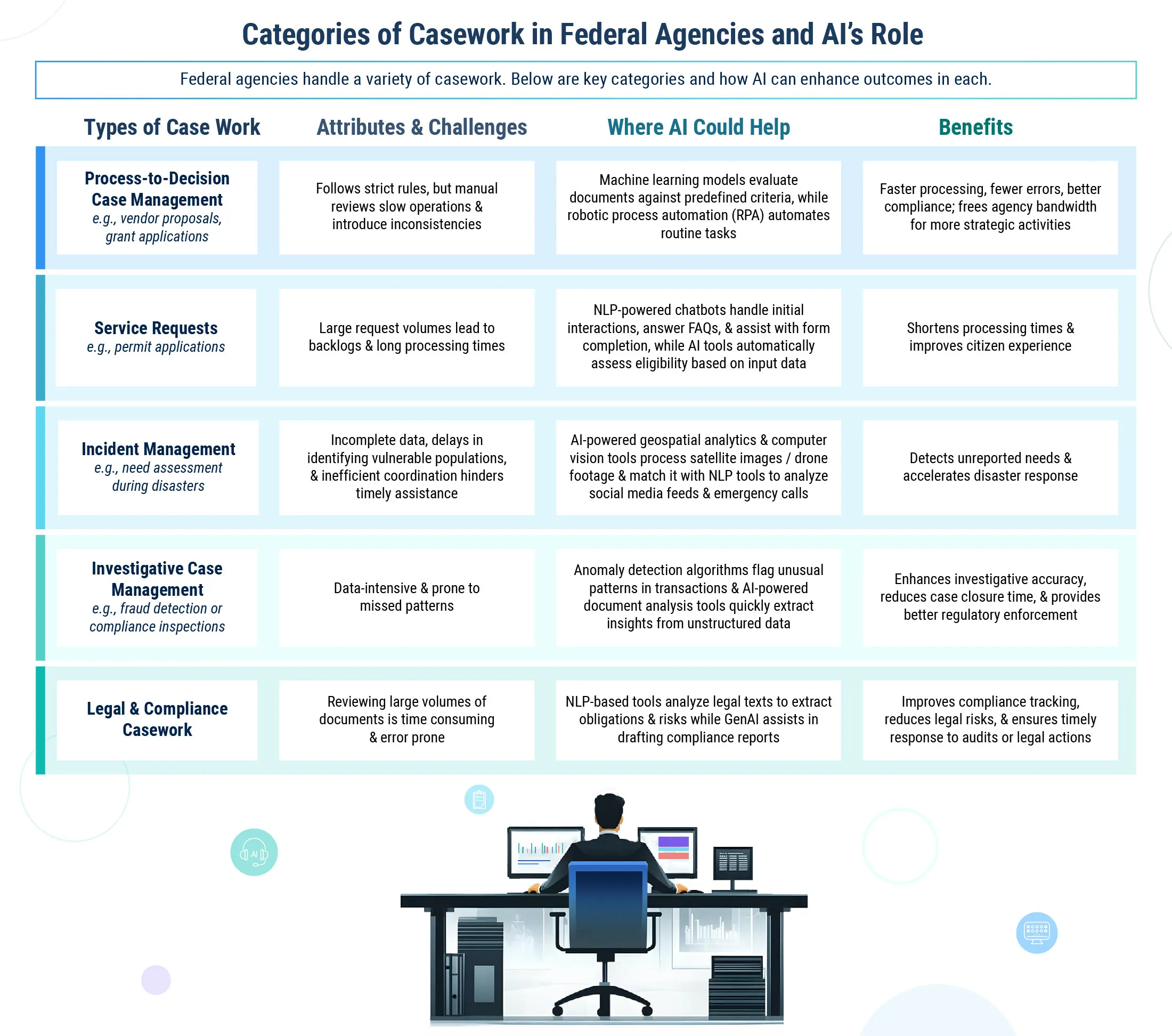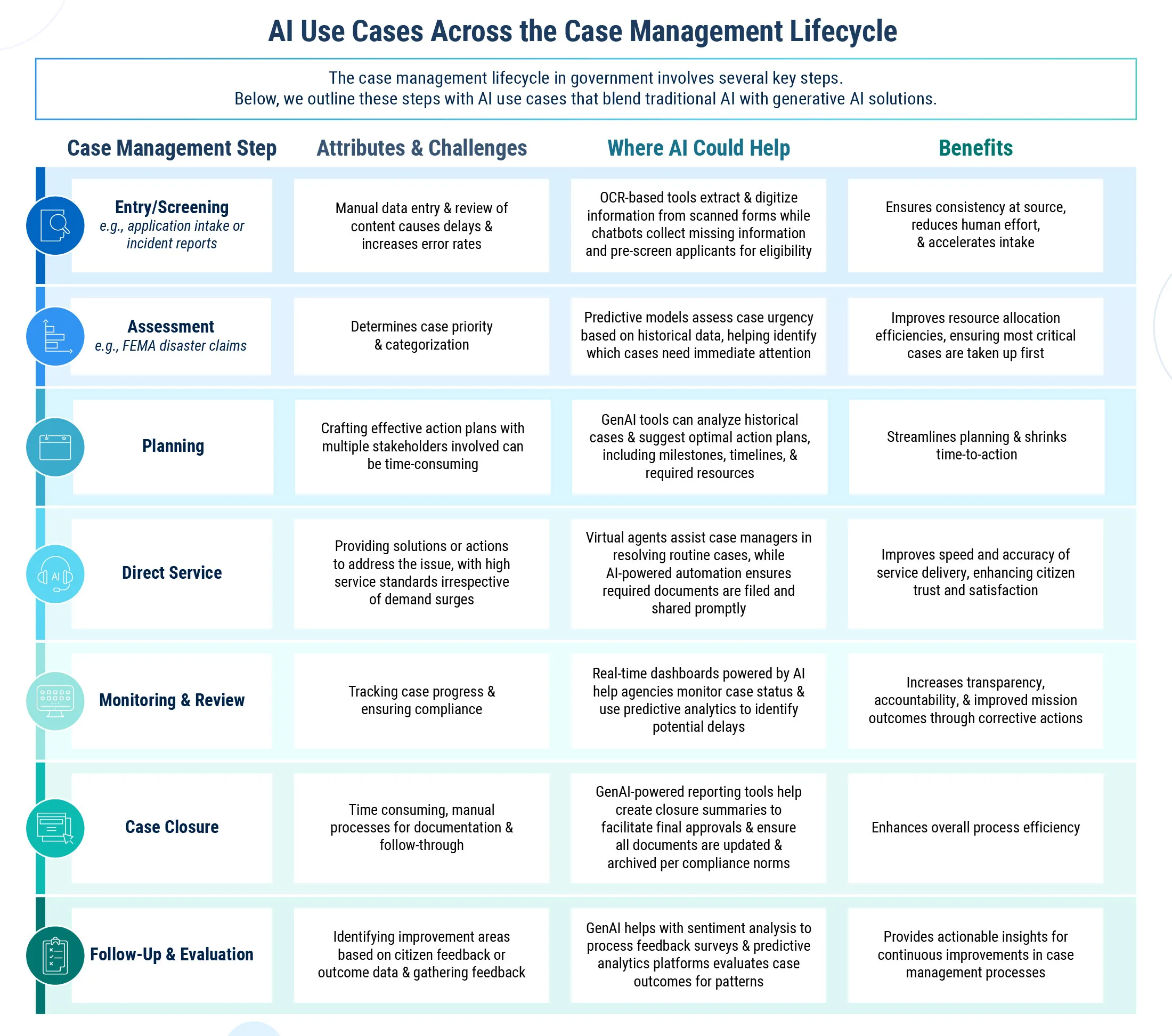By Anand Trivedi, REI Systems’ AI Offering Lead
Case Management’s Role in Federal Mission Goals
A hurricane strikes, tearing through a community. Homes are destroyed, families displaced, and resources stretched thin. In these moments, the Federal Emergency Management Agency (FEMA) depends on case management—not just as a process, but as the backbone of its entire response. Case management helps FEMA track each claim, coordinate vital resources, and ensure families get the aid they need, from immediate relief to long-term recovery. This precise coordination is what drives a federal agency to deliver when it matters most.
Case management is the organized process of aligning tasks, resources, and information to resolve cases efficiently. For an agency, this means handling thousands of cases—like disaster claims, immigration applications, and procurement actions—from start to finish. Good case management streamlines workflows, keeps stakeholders aligned, ensures compliance with regulations, and enables the agency to meet its mission goals.
Across the federal government, case management powers everything from disaster relief to immigration services. Agencies like the Food and Drug Administration (FDA), the Department of Homeland Security (DHS), and FEMA rely on it to deliver timely, impactful results. Whether accelerating asylum applications at U.S. Citizenship and Immigration Services (USCIS), managing disaster recovery at FEMA, or screening imports for the FDA, case management propels each agency’s mission.
The scale is staggering. The FDA investigates activities involving thousands of regulated products while USCIS handles millions of immigration applications. This workload requires meticulous data management, close stakeholder coordination, and strict regulatory compliance—all highly complex, high-stakes tasks.
Yet bottlenecks persist. Manual data entry, fragmented systems, and approval delays slow down processing times, drive up costs and strain service quality. At USCIS, immigration backlogs delay immigrants’ economic contributions, while FEMA’s slowed disaster response leaves communities exposed when they need help most.
AI-driven tools like predictive analytics and generative recommendations reshape case management by automating repetitive tasks, streamlining workflows, and delivering real-time insights. With AI, agencies operate smarter, faster, and keep a sharp focus on their mission.
Categories of Casework in Federal Agencies and AI’s Role
Federal agencies handle a variety of casework. Below are key categories and how AI can enhance outcomes in each:
AI Use Cases Across the Case Management Lifecycle
The case management lifecycle in government involves several key steps. Below, we outline these steps with AI use cases that blend traditional AI with generative AI solutions.
At REI, we are actively exploring these use cases with several federal customers. For example, our work with the FDA on AI-based import risk screening helps prioritize high-risk shipments, ensuring effective inspections. With USCIS and FEMA, we are developing AI solutions to streamline workflows and enhance service delivery.
Mitigating AI Risks in Case Management
AI has the power to reshape case management, bringing speed and precision to decisions that matter. But as with any powerful tool, it comes with risks that require sharp oversight. To harness AI responsibly, REI leans into a mindful approach, addressing each challenge—fairness, transparency, privacy, and human insight—with purpose. Here’s how we make AI a force for good in high-stakes case management:
- Bias and Fairness: Algorithms can mirror biases present in training data, leading to unfair or skewed outcomes. To tackle this, REI uses a mix of cloud-native and custom off-the-shelf bias detection tools like Amazon SageMaker Clarify, Azure’s Responsible AI dashboard, and IBM’s AI Fairness, among others, to help identify and mitigate biases early in the process, ensuring our models treat all cases equitably. Without these tools, unchecked biases could lead to unfair case management outcomes – a serious concern, especially in sensitive areas like healthcare and criminal justice.
- Transparency and Explainability: AI decisions can be tough to interpret, raising accountability concerns. REI prioritizes transparency by applying model validation protocols and mechanistic interpretability that make AI decisions clearer, helping users understand the “why” behind each recommendation. Without these protocols, AI models risk producing biased, inaccurate, or unreliable outcomes that could erode trust and undermine accountability.
- Data Privacy and Security: Handling large volumes of sensitive data makes privacy and security a priority. We implement robust security measures to protect against breaches and cyberattacks, ensuring data integrity and compliance.
- Dependence on AI: Relying too heavily on automation can lead to less human oversight, which raises the risk of errors or unintended biases going unnoticed. We design our AI systems with human-in-the-loop mechanisms. Maintaining a balanced approach between AI and human involvement helps ensure automation supports—rather than replaces—well-rounded, thoughtful decision-making.
REI takes a comprehensive approach to AI risk management, blending strong governance, fairness, transparency, and robust data security. Our solutions ensure AI-driven case management is powerful, responsible, and reliable.
Conclusion: Pioneering AI-Driven Case Management for Federal Agencies
Imagine a future where federal agencies tackle crises with unmatched speed, where immigration backlogs clear in record time, and communities rebuild faster after disaster strikes—all powered by AI’s precision and insight. This isn’t just innovation; it’s a bold reimagining of what government can accomplish.
AI is rewriting the playbook for federal case management, delivering faster insights and sharper decision-making to help agencies fulfill their missions with impact. With AI-powered tools, agencies streamline processes and deliver real results for the people they serve.
At REI, we’re leading this shift. Drawing on our federal IT expertise, we’re building AI solutions tailored to the unique demands of agencies like FDA, USCIS, FEMA, and NASA.
This is more than a shift in tools—it’s a new era of government efficiency, with AI driving smarter workflows and stronger mission outcomes. Our commitment to responsible AI ensures this technology advances with integrity, transparency, and security. Together, we’re building a government ready to tackle tomorrow’s challenges head-on.






